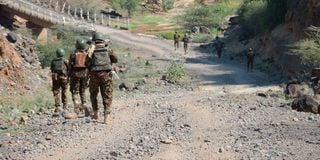Premium
Why there are no matatus, buses in Kapedo

Kenya Defence Forces soldiers walk down a deserted road leading to the notorious Kapedo bridge during an operation against banditry in December 2023.
What you need to know:
- Rampant attacks on motorists has forced PSV operators out of the route on safety fears.
- Ambulances ferrying patients from Kapedo to Marigat or Chemolingot have also not been spared.
For decades, locals in the North Rift region have borne the brunt of cattle raids that have claimed many lives and caused massive displacement.
In banditry-prone Kapedo on the border of Turkana and Baringo counties, residents are faced with another unique challenge; lack of public transportation.
Hapless villagers seeking medical attention in other towns or running errands have to hitch-hike on police vehicles.
Rampant attacks on motorists along the Chemolingot-Kapedo and Lokori-Kapedo roads has forced PSV operators out of the route on safety fears.
For Ms Evaline Ekaudu, a resident of Kapedo, the last time she saw a matatu or bus plying the Nakuru-Kapedo route was in the late 1990s when a bus christened Achegei used to operate.
It stopped its operations in 1997 following a series of attacks.
“Those traveling out of Kapedo have to board police trucks because that is the only means of transport here,” she explained.
Another resident, Mr Ali Etukan, said armed criminals hide in the bushes and attack any vehicle heading towards Kapedo.
This has led to a scarcity of essential commodities amid sky-high prices, especially for fresh produce.
“Getting vegetables is difficult because traders rely on police vehicles to ferry the produce from Marigat town,” said Mr Etukan.
Ambulances ferrying patients from Kapedo to Marigat or Chemolingot in Tiaty have also not been spared.
Despite being the only means of transport, police vehicles are also not completely safe because they are once in a while targeted or get involved in road accidents due to overloading.
Such was the case last Saturday when more than 21 people died and dozens others were seriously injured after an Administration Police vehicle they had boarded crashed in Moinonin on the Marigat-Loruk road in Baringo North Sub-county.
The police vehicle was heading to Kapedo from Marigat. Fourteen of the victims, including a child, died on the spot while seven others succumbed to their injuries on their way to hospital.
In 2014, four people, among them three police officers and a teacher, were killed by bandits who ambushed them in Kapedo, along the border of Baringo and Turkana County.
The General Service Unit (GSU) officers were on a mission to rescue their colleagues, who had been taken hostage by bandits.
In 2017, bandits shot dead three police officers and a civilian, who were on their way to Lokori after delivering food to their counterparts camping in Kapedo.
The officers were ambushed barely metres away from the spot where 19 others were shot dead in another ambush in 2014 while on a mission to recover a vehicle that was set ablaze in another botched operation.
On January 17, 2021, Emadau Tebakol, a General Service Unit (GSU) commander based in Kapedo was shot dead when he went to respond to a distress call from his juniors who had been attacked by armed criminals.
Two other officers were seriously injured after they were ambushed in Ameyan, seven kilometres from Kapedo.
The Rapid Deployment Unit (RDU) officers were heading to Nairobi from Lomelo in Turkana East through Marigat.
According to Baringo County Police Commander Robinson Ndiwa, the GSU and RDU officers deployed in Kapedo had sought to rescue their counterparts but were also attacked.
Four days later, another ambush was staged at the volatile bridge by bandits that saw RDU Chief Inspector Moses Lekariab and constable Benson Kaburu fatally shot.
On a tour of the area recently, Interpeace Country Director Hassan Ismael said the major impediment to peace in the region was illiteracy.
“Almost the entire population in Suguta Valley has never attended school,” he observed.
Building consensus between the political leaders and resolving the protracted land disputes in the region was also paramount, the official said.





